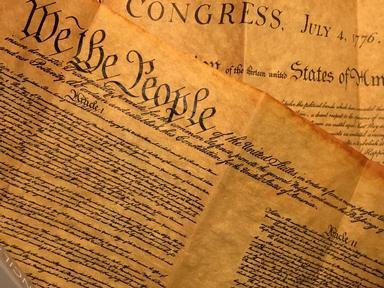Quiz Answer Key and Fun Facts
1. The "Bill of Rights" were the first ten amendments to what document?
2. Who was the English philosopher who had a strong influence on the Bill of Rights?
3. What delegate, who was to become a future president of the United States, proposed and shepherded the Bill of Rights into law?
4. What was the only state of the original thirteen colonies that refused to send delegates to work on the Bill of Rights?
5. Although today the Bill of Rights is generally interpreted to apply to all citizens, the original intent was much narrower. For which of these was the document intended?
6. A popular expression when one is asked an uncomfortable question is to say "I'll take the fifth on that", referring, of course, to the Fifth Amendment. Which of these concepts is NOT addressed by the Fifth Amendment?
7. Which of these is NOT a First Amendment guarantee?
8. What was the first state to ratify the Bill of Rights on November 20, 1789?
9. Connecticut was the last state to ratify the Bill of Rights. In what year did this occur?
10. What amendment preserves the concept that states that nothing left to the federal government should be left to the States?
Source: Author
Rehaberpro
This quiz was reviewed by FunTrivia editor
trident before going online.
Any errors found in FunTrivia content are routinely corrected through our feedback system.

